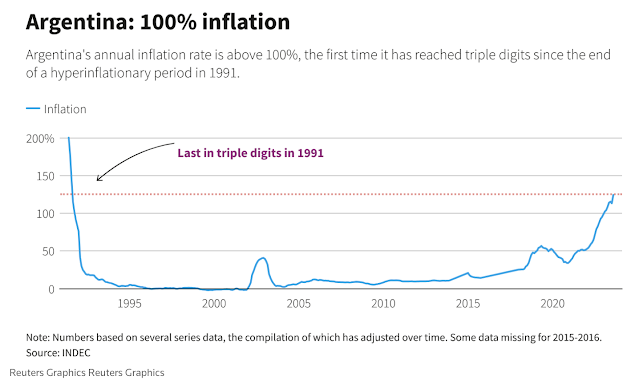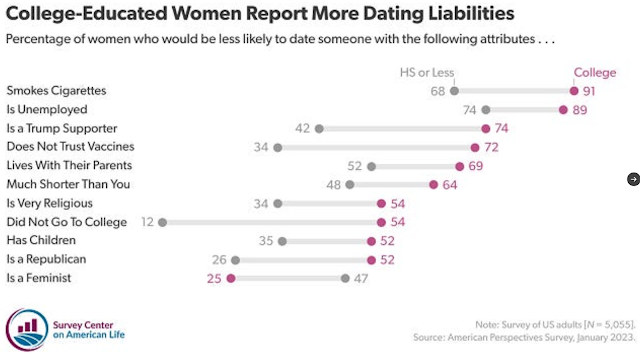Voters in Argentina and The Netherlands have been among the most consistent nations in the world of electing socialist minded leaders in office over the last 50 years or so.
In 10 out of the last 12 Presidential elections in Argentina the President has been from the Justicialist Party which was founded by Juan Peron and has always been known for its leftist, progressive policies.
It curried favor with voters and held power with large government benefit programs and a massive patronage system. Argentina's embrace of leftist policies have left the economy in ruins.
What was once one of the richest countries in the world has been impoverished by inflation and a weak economy that for decades has largely been controlled by various socialists who argue that social justice should be the guiding factor in all government decisions.
The Argentine peso is worth only one-ten-billionth what is was worth 100 years ago when the socialists first gained power.
Meanwhile, inflation has increased 757% just since 2019. It has recently been running at 143 percent annually at the same time that the country's GDP is shrinking.
 |
| Source: buenos-aires-barbers-books-history-19900-inflation-2023-10-07 |
The Netherlands has been famous for its socially liberal policies for many years. In the early 1980's it was known for having the most the extensive social security and welfare state in the world. These policies eventually proved too expensive to pay for and benefits were scaled back by the 1990's. However, the Netherlands approved measures to legalize euthanasia and gay marriage in the 1990's consistent with its leftist, progressive leanings.
More recently the Netherlands has been one of a number of European countries that have permitted significant numbers of Muslim migrants to enter the country.
This graph shows the dramatic increase in immigration in recent years.
 |
| Immigration, emigration, and migration balance in the Netherlands from 1995 to 2022 Source: Statista |
The Netherlands also has heavy representation of climate and animal rights activists among its Parliament
This has resulted in legislative proposals beginning in 2019 to halve farm livestock production and severely limit the use of nitrogen fertilizers in the country.
Both proposals would decimate the nation's farming industry and led to numerous protests by farmers over the last couple of years.
 |
| Source: https://www.theguardian.com/environment/2023/nov/16/nitrogen-wars-the-dutch-farmers-revolt-that-turned-a-nation-upside-down |
When human beings are exposed to pain or feel threatened they turn away.
Such was the case last week in which voters in both Argentina and the Netherlands made pretty significant turns to the right in national elections.
In Argentina, voters elected a self professed radical libertarian named Javier Milei as the new President.
Milei famously liked to wield a chainsaw in his campaign events to symbolize what he said he wants to do to the entrenched political bureaucratic class in Argentina.
Milei says he want to cut state spending by 15 per cent of GDP, slash the number of government ministries by almost half, dollarize the $600 billion Argentine economy and eliminate the country’s central bank.
Those would be big, big right turns in Argentina.
Can he succeed?
If he does it will largely have to come from the force of his personality and his popular mandate from the voters (he won 21 of 23 Argentine states). However, his party only has small numbers in both the upper and lower houses of the nation's legislature. His party also does not have one of the 23 governor's seat.
In the Netherlands, the Freedom Party led by Geert Wilders won the most seats in last week's Dutch elections.
Wilders will have to obtain the support of other parties to gain the role of Prime Minister but there is little question that the Parliament in that country will have turned much further right than it was previously.
What were the major issues Wilders and the Freedom Party ran on?
A proposal for a binding referendum on leaving the European Union.
Withdrawing the Netherlands from all international climate obligations.
A massive reduction in immigration.
What I found particularly interesting in the Netherlands vote was what appears to be a massive move to Wilders and the Freedom Party in the last few weeks after the Hamas attack on Israel and the significant Muslim and far left street marches for Hamas/Palestine.
Do you think that the Dutch voters might be wondering whether they might be next considering the amount of Muslim immigration that has occurred around them in recent years?
There has been a trend recently in Europe in the rise in power of parties on the right which favor strong nationalist agendas that are also more socially conservative.
This chart shows the percent of legislative seats held by so-called "far-right" parties in various EU countries.
59% of the seats in Hungary are held by conservatives.
35% in Poland (the largest % of any political party).
30% in Italy (the largest % of any political party).
23% in the Netherlands (the largest % of any political party).
Will we see more right turns in Europe as the inevitable clash of cultures deepens in the wake of the enormous mass migration of Muslims into these societies?
If we don't see it then Europe is not going to look like the Europe we have known in a very short period of time.
Demographics will make sure of it at the rate things are going.
If you doubt this, as an example, take a look at this chart tracking UK migration trends since 1850.
To say it is UNPRECEDENTED is an understatement.
Will we see a similar right turn in the United States in 2024?
All I know is that some of the same underlying issues that appear to be driving factors in the votes in Argentina and the Netherlands are also present in the United States right now.
-Dissatisfaction with the economy and inflation
-Anger about the political class and government bureaucracy
-Frustration with uncontrolled immigration
-Increasing questions about climate change alarmism
-Shock over the recent anti-Semitic actions and pro-Hamas demonstrations around the world
A lot can change in 11 months.
Do these issues fade, get worse or will they replaced by other concerns when we get to November, 2024?
In the end, turns in the votes of the people are determined by how the world turns.
Stay tuned.
There will surely be more twists...and turns.
And more drama.
That is the only thing that is certain.
















































